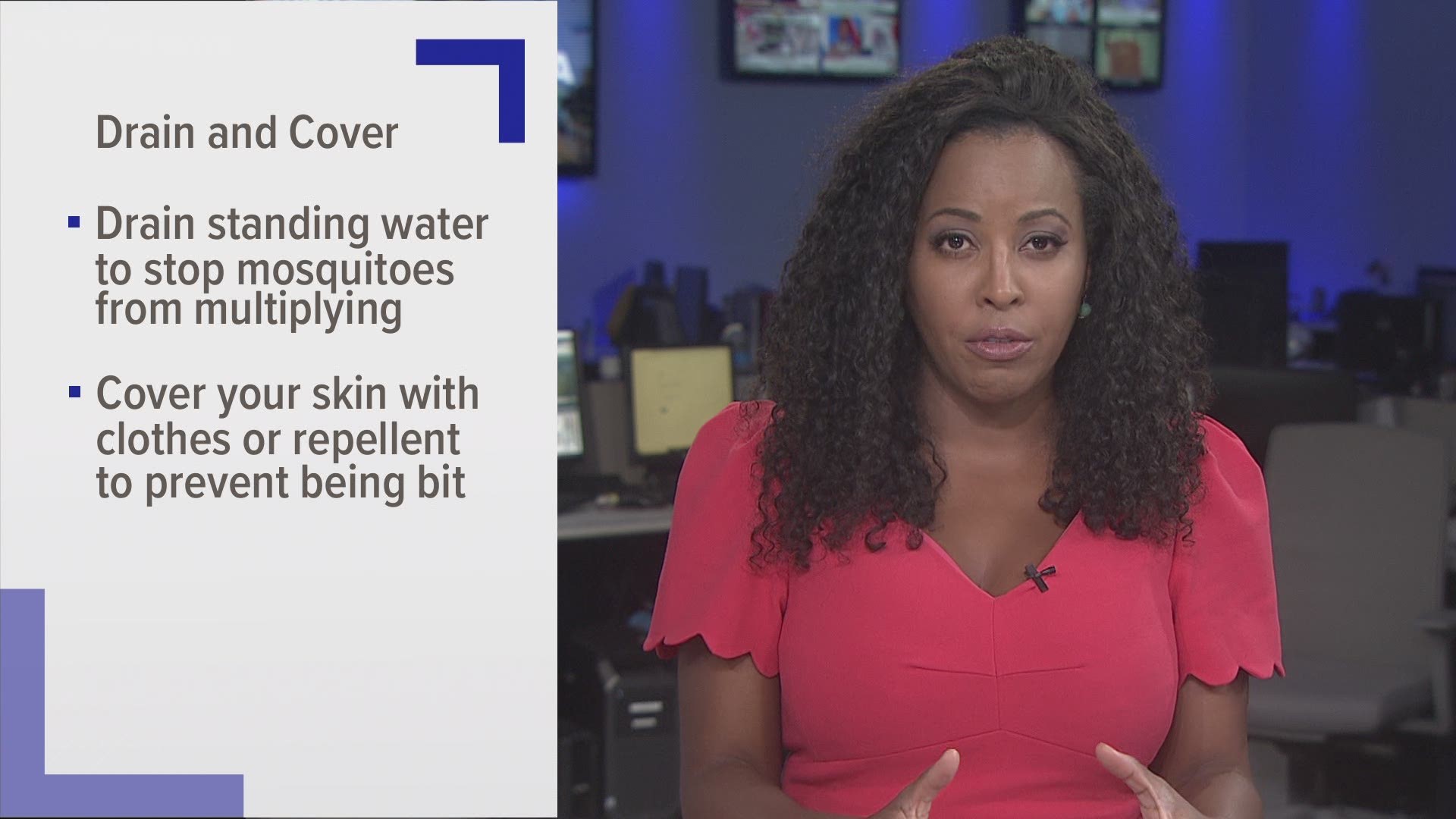MANATEE COUNTY, Fla. — A human case of West Nile Virus has been confirmed in Manatee County.
The Florida Department of Health announced the case on Thursday and warned people that there has been an increase in mosquito-borne disease reports in the area. County health leaders say there is "a heightened concern additional residents will become ill."
This particular case involved someone living off University Parkway near the Manatee/Sarasota county line. Three sentinel chickens have since tested positive for the virus, according to health leaders in Sarasota County.
About 80 percent of people who get West Nile virus do not have symptoms, and the people who do usually present flu-like symptoms. Those systems typically persist for a week or two, although can occasionally last up to a couple of months if the virus gets into the central nervous system. It's in those more rare cases that it can cause long-term physical effects or even death.
Locally, Manatee County Mosquito Control and DOH-Manatee officials combat the virus by trying to keep the total number of mosquitoes low through the use of aerial spraying, mosquito truck fogging and public awareness. They say you can take basic steps to prevent mosquito bites.
DOH-Manatee urged people to remember the phrase "Drain and Cover" and released the below guidance for protecting yourself from mosquitoes:
DRAIN standing water to stop mosquitoes from multiplying.
- Drain water from garbage cans, house gutters, buckets, pool covers, coolers, toys, flower pots or any other containers where sprinkler or rain water has collected.
- Discard old tires, drums, bottles, cans, pots and pans, broken appliances and other items that aren't being used.
- Empty and clean birdbaths and pets’ water bowls at least once or twice a week.
- Protect boats and vehicles from rain with tarps that don’t accumulate water.
- Maintain swimming pools in good condition and appropriately chlorinated. Empty plastic swimming pools when not in use.
COVER skin with clothing or repellent.
- Clothing - Wear shoes, socks, and long pants and long-sleeves. This type of protection may be necessary for people who must work in areas where mosquitoes are present.
- Repellent - Apply mosquito repellent to bare skin and clothing.
- Always use repellents according to the label. Repellents with DEET, picaridin, oil of lemon eucalyptus, para-menthane-diol, 2-undecanone and IR3535 are effective.
- Use mosquito netting to protect children younger than 2 months old.
Tips on Repellent Use
- Always read label directions carefully for the approved usage before you apply a repellent. Some repellents are not suitable for children.
- Products with concentrations of up to 30 percent DEET (N, N-diethyl-m-toluamide) are generally recommended. Other U.S. Environmental Protection Agency-approved repellents contain picaridin, oil of lemon eucalyptus, para-menthane-diol, 2-undecanone or IR3535. These products are generally available at local pharmacies. Look for active ingredients to be listed on the product label.
- Apply insect repellent to exposed skin, or onto clothing, but not under clothing.
- In protecting children, read label instructions to be sure the repellent is age-appropriate. According to the Centers for Disease Control and Prevention (CDC), mosquito repellents containing oil of lemon eucalyptus or para-menthane-diol should not be used on children under the age of three years. DEET is not recommended on children younger than two months old.
- Avoid applying repellents to the hands of children. Adults should apply repellent first to their own hands and then transfer it to the child’s skin and clothing.
- If additional protection is necessary, apply a permethrin repellent directly to your clothing. Again, always follow the manufacturer’s directions.
COVER doors and windows with screens to keep mosquitoes out of your house.
- Repair broken screening on windows, doors, porches, and patios.
This tool from the Environmental Protection Agency can help you find an insect repellent that works for you.
What other people are reading right now:
- Trump, Biden will both campaign on Thursday in Tampa
- Can I change my vote in Florida? Google search spikes after President Trump's tweet
- NHC monitoring system in southwestern Caribbean Sea, could become tropical depression next week
- Florida man accused of changing Gov. DeSantis' voter information
- NFL plans to limit capacity at Super Bowl LV in Tampa
- 3 ways election night 2020 could be different
- What you need to know about the 6 constitutional amendments on Florida ballots
►Breaking news and weather alerts: Get the free 10 Tampa Bay app
►Stay In the Know! Sign up now for the Brightside Blend Newsletter

